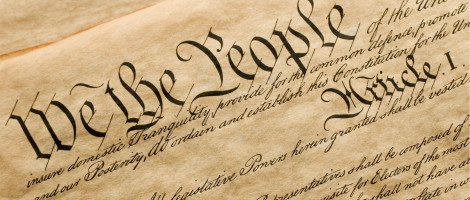By William M. Pinson, Jr.
“BAPTISTS OPPOSE CONSTITUTION” could have been the headlines of a newspaper in 1787.
Why did Baptists strongly oppose the newly drafted Constitution of the United States of America? In brief, because the document failed to provide a guarantee for religious freedom, a belief cherished by Baptists.
From the earliest days of the settlement of America by Europeans, religious freedom was practically non-existent. Persecution for religious views contrary to those of government-supported churches was widespread and severe in most of the thirteen colonies. Although few in number, the Baptists in those colonies courageously advocated religious freedom, not something to be tolerated but as a fundamental God-given right. Moreover, they pled for religious freedom for all, not just for themselves.
Baptists paid a high price for their efforts. They suffered bloody public beatings, harsh imprisonments, crippling fines, and attacks by mobs. Some were removed from office, such as Henry Dunster, the first president of Harvard University, who was fired for adopting Baptist beliefs. But the Baptists would not be silenced.
The Baptist stubborn insistence on religious liberty resulted from the fact that the belief was not a superficial part of Baptist doctrine but an essential ingredient. In fact, religious freedom relates to every major belief of Baptists, such as the Lordship of Christ, the authority of the Bible, salvation by grace through faith alone, believer’s baptism, a born-again church membership, church autonomy, and evangelism. To be true to their Bible-based beliefs, Baptists paid whatever price was called for to stand for religious freedom.
And this they did. Baptists blanketed the colonies with appeals for religious freedom. In spite of persecution, they preached sermons, wrote books and pamphlets, and organized associations to set forth the arguments for freedom of conscience. Baptists met with delegates to the Continental Congress to plead the cause of religious freedom. In the armed revolution against Great Britain, Baptists fought side by side with those who had oppressed them in the hopes of securing freedom for all. When the new nation was formed on the rickety Articles of Confederation, Baptists lobbied government leaders to provide religious freedom. When a convention was called to “form a more perfect union,” Baptists prayed for a provision for religious liberty. Unfortunately, the new Constitution lacked such a provision.
Finding the Constitution flawed, Baptists set out to defeat its ratification. The signing of the Constitution by the delegates to the Constitution Convention on September 17, 1787, did not establish a new nation. That required the ratification of the Constitution by at least nine states. The battle over ratification raged for months. In Virginia, a key state in the process, Baptists, led by pastor John Leland, worked to defeat ratification. Leland lived in the same area as James Madison, who was running as a delegate to ratify the Constitution. Leland opposed him but agreed to support Madison if he would promise to work to provide an amendment to the Constitution guaranteeing religious freedom. Madison promised that he would, Leland and other Baptists supported him, Madison won, and true to his promise when the Constitution was finally ratified and the new government was formed, Madison introduced amendments that we know as the Bill of Rights. The First Amendment guaranteed religious freedom. Baptists became enthusiastic supporters of the new government.
However, the struggle was not fully over. The First Amendment applied only to the national government, not to the states. Not until 1833 was the last government-supported church disestablished, in Massachusetts. Finally, with the passage of the Fourteenth Amendment in 1868, the First Amendment’s provision for religious liberty applied to the states.
Yet, the provision for religious freedom in the Constitution remains in perpetual jeopardy. Baptists and others must maintain vigilance. Otherwise, what has been won at such great price will be lost.
Dr. Pinson is executive director emeritus of the Baptist General Convention of Texas. For more information on the Baptist relation to the Constitution, visit baptistdistinctives.org and read the book Baptist Beliefs and Heritage in the Baptist Identity Series.
Texas Baptists is a movement of God’s people to share Christ and show love by strengthening churches and ministers, engaging culture and connecting the nations to Jesus.
The ministry of the convention is made possible by giving through the Texas Baptists Cooperative Program, Mary Hill Davis Offering® for Texas Missions, Texas Baptists Worldwide and Texas Baptist Missions Foundation. Thank you for your faithful and generous support.
Subscribe to receive stories like this one directly to your inbox.
We are more together.
